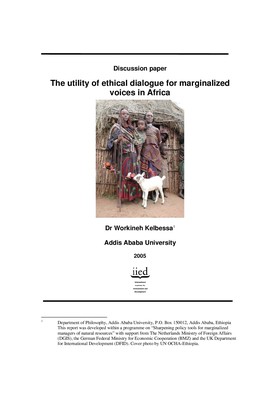The utility of ethical dialogue for marginalized voices in Africa

The Oromo and other African people have fostered belief systems and social norms that encouraged or even enforced limits to the exploitation of biological resources. Yet the tendency to idealize indigenous knowledge should be resisted - some practices and beliefs can be a hindrance to development and environmental protection. Indigenous practice has been challenged by modernization, the market economy, transnational corporations, foreign religions, the government’s acculturation and assimilation policies. Being influenced by these new values, people now use natural resources as objects for exploitation and profit making. Ethical dialogue is a necessary condition for authentic development among indigenous, poor, or otherwise marginalized groups. Presently civil society is trying to push this kind of dialogue to come to the surface. This report makes a series of recommendations about how this might be supported.
Cite this publication
Available at https://www.iied.org/13508iied